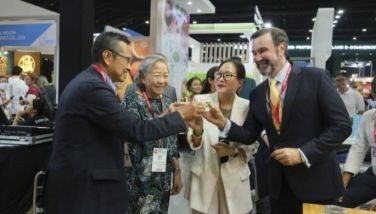H.E. Ambassador Harry K. Thomas Jr. (part 2)

Last week’s column on our interview with current US Ambassador to the Philippines H.E. Harry K. Thomas Jr. elicited quite a few positive comments from friends and readers of this column. While I would normally allot a Part II for trade, cultural and educational exchanges between the two countries, I decided to give space to the different on-going projects from the different American agencies involved in the Philippines, gathered from materials provided by Ambassador Thomas’ staff.
While there will always be contentious issues raised from conflicting sides, the Philippines, as Southeast Asia’s oldest democracy, has always been considered a US ally and regional security partner. USAID has been in the Philippines for so long that even cultural minorities in far Mindanao or Kalinga know of them. Their peace and security programs here include providing job skills to former combatants and training local officials in dispute resolution mechanisms in over 1,000 villages as well as vigilant anti-trafficking efforts. They work closely with the Philippine government and are especially active in the Mindanao area where they have implemented a $21 million Millennium Challenge Account Philippines Threshold Program to address corruption and improve revenue administration, especially in areas like taxes and customs administration, elections and the judiciary.
Speaking of the Millennium Challenge Corporation, they recently approved a five-year agreement with the Philippines aimed at reducing poverty through economic growth. Projects include the modernization and reform of the Bureau of Internal Revenue, a special development project called Kalahi-CIDSS, and the rehabilitation of a secondary national road in Samar.
Few of us know of the Kalahi-CIDSS project which is aimed at rural areas steeped in abject poverty. By directly providing infrastructure and services and strengthening community participation in developmental and governance activities, the ultimate goal of poverty reduction becomes more real and doable. It seeks to provide the link between what the communities need and what the government has designed as developmental projects. Grants will be given directly to the local communities and the Department of Social Welfare and Development has been tasked to implement the project under a National Steering Committee composed of government representatives and NGOs who will collaborate with the World Bank and the local governments. With this infrastructure in place, we in the private sector are more optimistic that real change looms bright and clear in the horizon. Approximately $120 million has been appropriated for this project.
And then there is that long stretch of road segment in Samar that connects the provinces of Samar and eastern Samar. This secondary national road is all of 222 kilometers, part of the Secondary National Road Development Project that is likewise a beneficiary of the Millennium Challenge Corporation’s compact with the Philippines and $214.4 million has been allocated for this project. The reduction in transportation costs, savings in vehicle operating costs as well as time savings and reduced maintenance costs carry just as much weight as the increase in commerce and trade once these secondary national roads are fully rehabilitated.
And to round off the five-year agreement of aid from the Millennium Challenge Corporation is the $54.4 million allocation for the Revenue Administration Reform Project which is aimed at raising tax revenues and reducing tax evasion and corruption specifically in agencies such as the Bureau of Internal Revenue and Customs Collection. This is an ambitious but doable project that hopes to increase the efficiency of revenue collection through a modernized BIR. The idea is to reduce if not altogether remove the discretion of tax and customs collection agents or officers, removing the element of partiality and reconciling more efficiently potential and actual collection by these agencies. This should be interesting to see as these two agencies top the list of the most infamous government agencies in Philippine history. Modernizing the system certainly helps, but what will really cut it is shrinking the space for subjective evaluations of individual agents, thus providing for more impartiality in reviewing individual tax cases in the case of the BIR and individual shipments in the case of the Bureau of Customs. The general public will be hard put to believe that any real and substantial change will happen in the near future, but we have to start somewhere, and this is certainly the right step towards change.
And then there is the Peace Corps which has been here since 1961 when 130 volunteers came here to serve as teachers of English, math and science. In fact, Peace Corps Philippines is the agency’s second oldest program. Since 1961, some 8,000 volunteers have served in this country, and as requested by the Philippine government, Peace Corps volunteers have now returned to public school classrooms, working alongside our own local teachers to improve English proficiency in reading and writing for both students and teachers. They also engage in community outreach programs such as literacy classes, developing youth leadership, and assisting in the implementation of coastal management programs to include fisheries monitoring and waste management. Peace Corps volunteers have also ventured into livelihood and community development as well as information systems development in the countryside.
Ambassador Harry K. Thomas Jr. seems truly enamored with the Philippines and says that there isn’t a better place to serve than here. The educational and cultural exchanges that he has initiated in the two years that he has been posted here are quite commendable, and his sports diplomacy programs are likewise very popular with Filipinos.
The easy-going, affable ambassador is likewise truly appreciated here, and though he says that Tagalog is “mahirap, mahirap Butch”, referring to his sincere efforts to speak Tagalog, his friends get a big laugh when he says “panget, panget” with a strange twang when his game is bad and “tabi, tabi po” when his golf balls fall by the wayside.
Welcome, Mr. Ambassador.
Mabuhay!!! Be proud to be a Filipino.
For comments: (e-mail) [email protected]
- Latest
- Trending






























